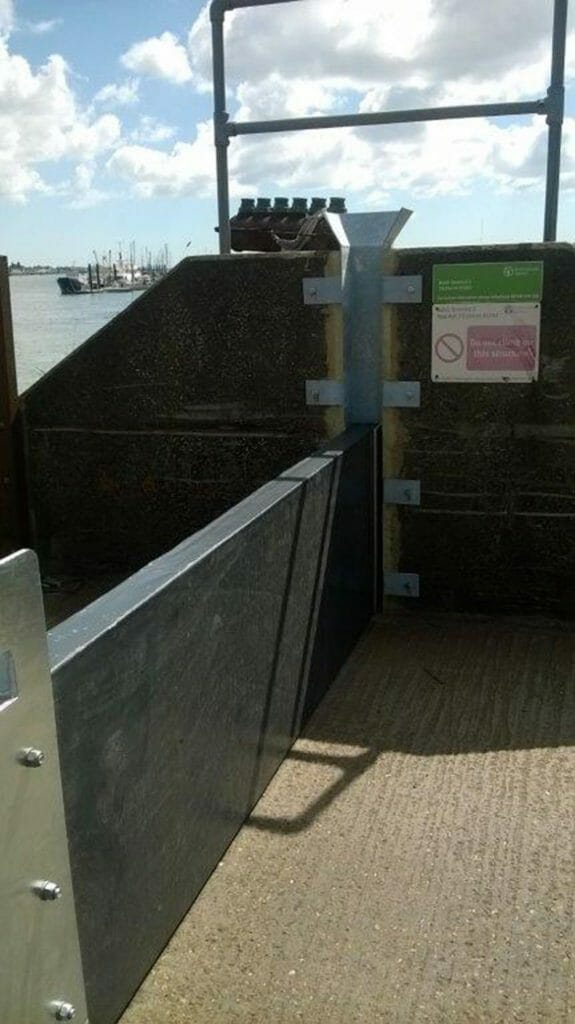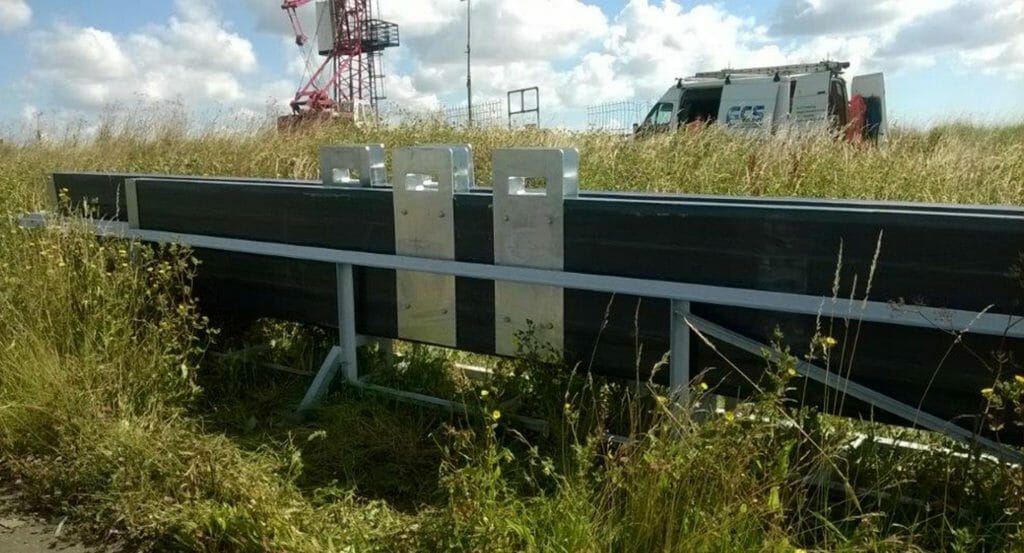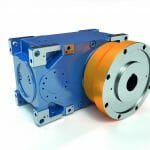As part of a refurbishment and upgrade project, ECS Engineering Services has renewed drop gates at Baltic Wharf, Burnham on the River Crouch in Essex. The gates are based on its innovative stoplogs that are made from durable, high strength fibre reinforced polymer (FRP).
A vital part of the North Sea trade network, Baltic Wharf Burnham provides a regular ferry service to Riga and Liepaja in Latvia and Pärnu in Estonia. The port has been in operation for about 100 years and continues to thrive mainly on the timber trade with Scandinavia and Eastern Europe. Over 60 small cargo ships dock each year using a deep water passage through the moorings at Burnham on Crouch. The wharf also has 62 acres of storage and facilities including a saw mill to process the imported timber.
The drop gates are made up of a number of stoplogs, the original ones being timber. They are vital for protecting the Baltic distribution wood yard and nearby boat yard and marina from high water in this tidal river and for safeguarding access to two jetties where unloading cranes are located. However, after many years’ service they were in need of refurbishment and renewal, so the Harbour Authority commissioned ECS to conduct a detailed survey and suggest remedial solutions.
One of the major findings from the survey was that the existing stoplogs were coming towards the end of their useful life and that their replacement was the best option. It was also noted that the existing concrete wing wall which has grooves for accommodating the stoplogs was also in poor condition.
With these findings and other information from the survey, it was decided to work up a solution that involved ECS designing, fabricating and installing new steelwork log guides which were to fit inside the existing wing walls to secure the stoplogs. ECS was also asked to design and deliver bespoke new stoplogs. ECS suggested that they be produced using long-life fibre reinforced polymer (FRP), for which it works with specialist company FiberCore Europe of Rotterdam.
ECS has an agreement that gives it exclusive rights to install a range of FRP products for water control, including stoplogs, produced by FiberCore Europe. This provides a strategic extension to ECS’s steel fabrication services which is particularly useful for large scale water control installations, most of which require items such as stoplogs to be produced to bespoke dimensions.
FRP gives stoplog designers a number of advantages over the traditional steel alternative. These include resistance to corrosion and ultraviolet deterioration, lighter weight reducing the size of the required lifting equipment and effectively zero maintenance over a lifetime that could well be 50 to 100 years. Another very practical advantage of FRP is that it is not at all attractive to thieves; in contrast steel and aluminium stoplogs, especially those stored in the open can be attractive to some scrap metal thieves.
FRP stoplogs can be designed and constructed for almost any combination of width and depth dimensions, in almost any size and in single or multiple sections. Significantly they become more cost effective in comparison with steel, the larger the square meterage used.

ECS Engineering Services has renewed drop gates at Baltic Wharf, Burnham on the River Crouch in Essex. The gates are based on its innovative stoplogs that are made from durable, high strength fibre reinforced polymer (FRP).

Designers from FiberCore Europe and ECS Engineering worked together to create optimum dimensions and ECS also made special fork lift attachments for the logs, which were fitted on site in Burnham.

The original stoplogs were made of timber. However, after many years’ service they were in need of refurbishment and renewal, so the Harbour Authority commissioned ECS Engineering to conduct a detailed survey and suggest remedial solutions.
Designers from FiberCore Europe and ECS worked together to create optimum dimensions and ECS also made special fork lift attachments for the logs, which were fitted on site in Burnham. One of FRP’s many benefits is its light weight, which allows easy handling, but for this project they design team had to use careful calculations in order to avoid positive buoyancy.
With the new drop gates installed and proven effective in use, Baltic Wharf is ready for many more years as a successful, reliable and efficient port for trade with Scandinavia and beyond.



